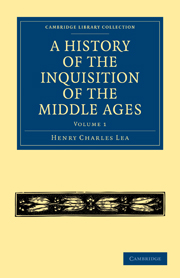Book contents
- Frontmatter
- PREFACE
- Contents
- BOOK I—ORIGIN AND ORGANIZATION OF THE INQUISITION
- CHAPTER I THE CHURCH
- CHAPTER II HERESY
- CHAPTER III THE CATHARI
- CHAPTER IV THE ALBIGENSIAN CRUSADES
- CHAPTER V PERSECUTION
- CHAPTER VI THE MENDICANT ORDERS
- CHAPTER VII THE INQUISITION FOUNDED
- CHAPTER VIII ORGANIZATION
- CHAPTER IX THE INQUISITORIAL PROCESS
- CHAPTER X EVIDENCE
- CHAPTER XI THE DEFENCE
- CHAPTER XII THE SENTENCE
- CHAPTER XIII CONFISCATION
- CHAPTER XIV THE STAKE
- APPENDIX
CHAPTER III - THE CATHARI
Published online by Cambridge University Press: 29 August 2010
- Frontmatter
- PREFACE
- Contents
- BOOK I—ORIGIN AND ORGANIZATION OF THE INQUISITION
- CHAPTER I THE CHURCH
- CHAPTER II HERESY
- CHAPTER III THE CATHARI
- CHAPTER IV THE ALBIGENSIAN CRUSADES
- CHAPTER V PERSECUTION
- CHAPTER VI THE MENDICANT ORDERS
- CHAPTER VII THE INQUISITION FOUNDED
- CHAPTER VIII ORGANIZATION
- CHAPTER IX THE INQUISITORIAL PROCESS
- CHAPTER X EVIDENCE
- CHAPTER XI THE DEFENCE
- CHAPTER XII THE SENTENCE
- CHAPTER XIII CONFISCATION
- CHAPTER XIV THE STAKE
- APPENDIX
Summary
The movements described above were the natural outcome of antisacerdotalism seeking to renew the simplicity of the Apostolic Church. It is a singular feature of the religious sentiment of the time that the most formidable development of hostility to Rome was based on a faith that can scarce be classed as Christian, and that this hybrid doctrine spread so rapidly and resisted so stubbornly the sternest efforts at suppression that at one time it may fairly be said to have threatened the permanent existence of Christianity itself. The explanation of this may perhaps be found in the fascination which the dualistic theory—the antagonism of co-equal good and evil principles—offers to those who regard the existence of evil as incompatible with the supremacy of an all-wise and beneficent God. When to Dualism is added the doctrine of transmigration as a means of reward and retribution, the sufferings of man seem to be fully accounted for; and in a period when those sufferings were so universal and so hopeless as in the eleventh and twelfth centuries, it is possible to understand that many might be predisposed to adopt so ready an explanation. Yet this will not account for the fact that the Manichæism of the Cathari, Patarins, or Albigenses, was not a mere speculative dogma of the schools, but a faith which aroused fanaticism so enthusiastic that its devotees shrank from no sacrifices in its propagation and mounted the blazing pyre with steadfast joy.
- Type
- Chapter
- Information
- A History of the Inquisition of the Middle Ages , pp. 89 - 128Publisher: Cambridge University PressPrint publication year: 2010First published in: 1888

